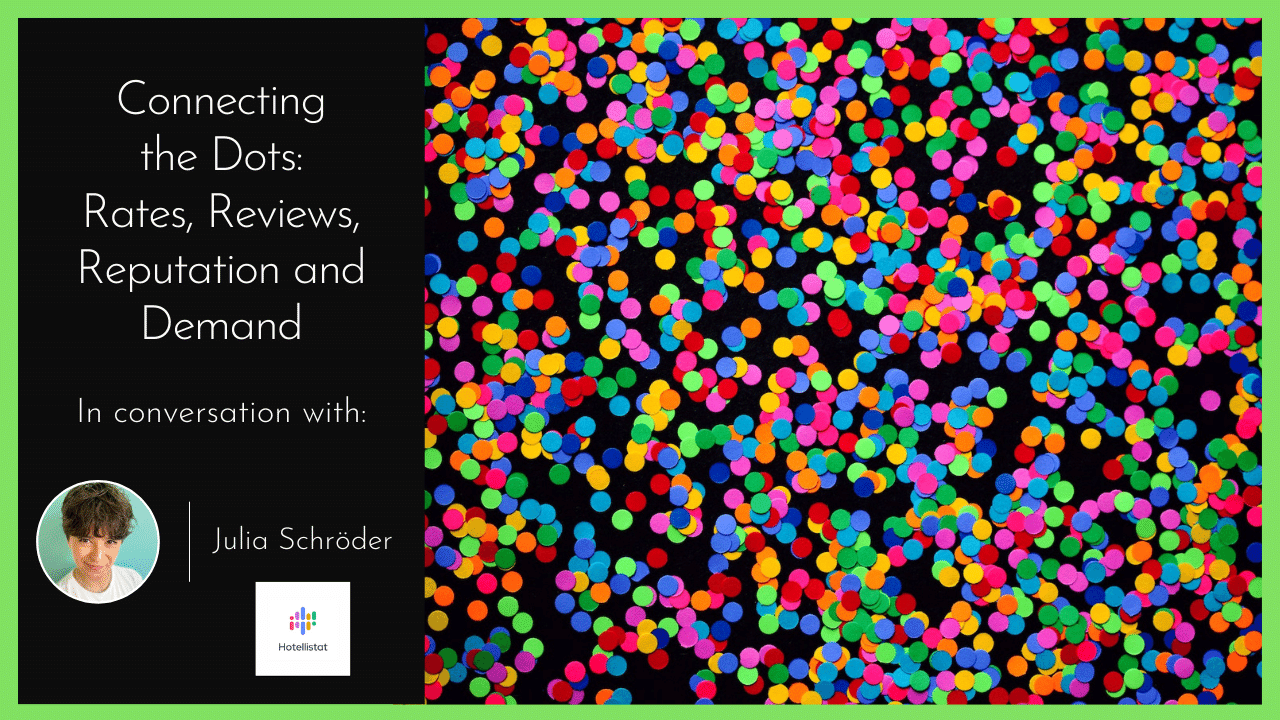Hi, welcome to another expert insights discussion.
Today we are joined by Julia Schröder from Hotellistat, one of our Expert Partners.
In this discussion we look at the importance of connecting the data dots between rates, reputation, reviews and demand to gain commercial insights, drive more bookings, increase revenue and enhance profitability.
We touch on the wealth of data that sits in a hotel operation.
The correlations and cause-effect relationships that can impact dramatically on a Hotel’s performance positively or negatively.
And how machine learning and AI can help hoteliers manage, what feels at times, like an insurmountable challenge.
You can see a summary of the points below 👇🏻
Really hope you enjoy the conversation 👍🏻
Subscribe to our weekly newsletter and stay up to date
👀 WATCH NEXT (A few of our other videos)
💢 Has The Sustainability Topic Reached Marketing and Revenue Teams?
https://youtu.be/8e2rJhPwY8k
💢 The Potential Impacts of Ignoring Your Hotel Price Competitiveness
https://youtu.be/aPxlZgIRoBU
💢 How Controlling Your Hotel Pricing Could Increase Bookings by 34%
https://youtu.be/U7LxJLRUbls
💢 Genuine Hotel Sustainability Unrealistic Without Strong Leadership
https://youtu.be/FWpKWQioCyk
💢 Win More Hotel Meetings And Group Revenue With Less (Time and Staff) https://youtu.be/zWQO7s1rgtk
👣 HOW TO FOLLOW US
LinkedIn: https://www.linkedin.com/company/revenue-hub
Facebook: https://www.facebook.com/revenuehub/
Twitter: https://twitter.com/revenue_hub
YouTube: Subscribe Link
🎙LISTEN TO OUR PODCAST
Spotify
Apple Podcasts
Google Podcasts
Stitcher
🎞 VIDEO CHAPTERS
00:56 Guest welcome and topic intro
02:05 When we talk about data, what data are we talking about
07:46 How do you balance the quantity and quality of data
11:32 Real world correlations or cause effect relationships
17:59 Machine Learning, AI, What is the difference and how can it work?
30:00 How does Hotellistat use AI and Machine Learning.
35:15 Summary
39:34 Further videos and subscriber link
Below is a summary of the points discussed:
What type of data can we leverage:
- PMS
- Competitor
- Event
- IBE
- Metasearch
- Reputation
- Weather
It’s not just quantity but quality. How do we ensure the quality of data?
- When it comes to PMS data, it’s up to the hotel and employees. Need to fill out all reservation details in order to have good-quality PMS data.
- Segmentation, Channel, Source, Ratecode, Room Type, PAX, LOS, CXL, CXL reasons, Board, etc.
- High-quality competitor data through own RateShopper – Real-time update possible
- Data Science team, which is continuously engaged in the validation of data. -> For example, typos and duplicates are detected and cleaned up to ensure quality (through AI)
Looking at all this data, and potential value, can you give any examples of correlations and cause-effect relationships that could benefit hoteliers
- Weather -> fluctuations in demand, for example, short-notice pick-up
- Events -> Willingness to accept higher prices if event location is close to hotel
- Holiday/Vacation Dates -> high/ low demand periods -> indicators for marketing activities and promotions
- Reputation -> positive or negative effects on the guests’ perception of the price-performance-ratio and thus their price acceptance
How does Machine Learning work to make sense of this data?
Recognizing patterns and relationships in large data sets. Examples:
- Most common Machine Learning algorithms in daily life are product recommendations. Targeted marketing with retail uses Machine Learning to group customers based on buying habits or demographic similarities by extrapolating what one person may want from someone else’s purchases.
- While some suggested purchase pairings are obvious, machine learning can get eerily accurate by finding hidden relationships in data and predicting what you want before you know you want it.
- If data is incomplete, sometimes you may end up with an off-base recommendation.
- Not buying it is another data point to learn from.
- Wind direction from a particular direction is a hospitality example. Kite surfers are waiting for a specific wind direction to be able to kite surf.
- Or think about ski resorts. Due to global warming, snow probability is way lower than it used to be. Weekend skiers book their ski trip only when there is snow or even fresh powder.
- In both examples, the Machine Learning algorithm detects short notice pickup for both scenarios, learns from it and whenever these scenarios take place it will automatically increase the room rates.
How is AI different to machine learning, where does it come into play?
- Provides context and comprehension to make decisions e.g. hotel pricing
- In Hotellistat the AI interprets and correlates the Machine Learning data and serves the outcomes on a silver platter. Customers save time analyzing tons of info in order to come to a conclusion.
- ARIS can translate the findings into direct action.
- Pain points that can be identified and remedied immediately by analyzing the guest reviews – i.e. quality assurance.
How does Hotellistat use data, machine learning and AI to benefit hoteliers?
- First, the system recognizes what is actually hotel-relevant data for the specific hotel, and then it identifies patterns and correlations in this data.
- Transparency is a key difference to other systems that say work with AI. Hotellistat displays the ARIS findings and decisions in a way that is comprehensible to the hotelier.
Is it all about the machine now, what about the human element?
- Machines can do the heavy lifting for humans. The human is still there to make final decisions
- In HS you can still put your human input in our recommendation for example.





